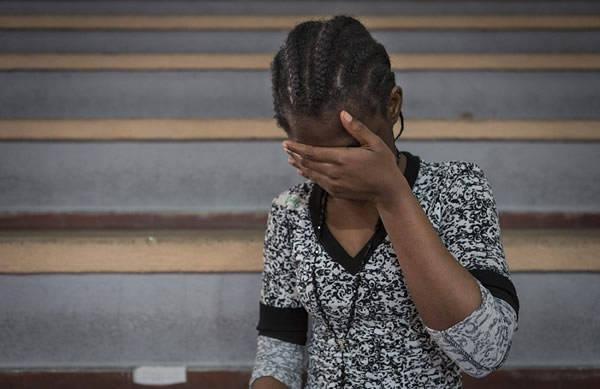When guardians become predators…girl child under threat
INNOCENTLY, Sharon Makomo (13) (not real name), with a glass of water in hand, rushes to her parents’ main bedroom to give to her father who is lying on the bed half-naked.
This is supposed to be place where she can feel safe than any other place in the world.
Her siblings, aged seven and five respectively, had been sent to the fields for some chores by the father while their mother was away at a funeral wake.
Little did she know that the man she called her father had since turned into a predator and his main target was his offspring.
By setting her foot into the bedroom, she had entered the lion’s den and like a serpent, swiftly, the father attacked.
He grabbed her, pinned her down and forced himself on her. She screamed but her father would not be restrained. He had turned into a monster.
Shocked and pained with what had just happened, Sharon struggled to walk out of the bedroom let alone look at her father’s menacing face.
She could not wait for her mother to return and tell her what had just happened to her with high hopes that she would do something about it.
To her surprise, the mother could not do anything about it, she chose to sweep the matter under the carpet for reasons best known to her.
This became a passport for the sex pest father to take any slightest opportunity to sexually abuse his daughter regularly, with the mother choosing to remain mum.
It only took neighbours to notice behavioural changes in the child and confronted her leading to her opening up about the rape ordeal.
The neighbours notified the Department of Social Welfare which in turn roped in the police, resulting in the man’s arrest.
After going through a full trial, he was condemned to 45 years in prison by a Gokwe magistrate.
Although this might sound like a befitting sentence for the man, sections of society suggest the mother should have suffered the same for her role in the abuse of the child, but that’s a topic for another day.
While the man was jailed, the deep scars and wounds of betrayal that were left on the child will forever remain etched in her heart.
After all, of all the places, home is supposed to be the safest place for anyone, let alone the girl child, who goes through a lot in her day-to-day life.
Girls and women in general, risk being sexually abused, maimed, or even raped on the way to school or work both in rural or urban set-ups.
Besides providing shelter, a home is supposed to be a safe place where everything including safety, is guaranteed.
Things, however, seem to have changed with such cases being on the rise lately as parents, relatives and guardians (mostly step-parents) turning against their children.
Although sexual abuse is the most common, there are instances where physical and emotional abuse have been reported.
Police in the Midlands Province recently raised concern over cases of guardians sexually abusing those they are supposed to protect.
According to the police, in two days, (4 and 5 January 2024 to be precise) Midlands Province recorded six rape cases, all of which involved close relatives ranging from uncles, stepfather, father-in-law and traditional healer.
“Police have noted that rape cases against women and children which are perpetrated by either relatives or people known to them continue to rise. Observations indicate that these rape cases occur at any time of the day both in urban and rural areas. They are committed by men usually trusted by victims,” said Midlands provincial police spokesperson, Inspector Emmanuel Mahoko in a statement.
The trusted people are prowling on vulnerable women and young children while some claim to be influenced by traditional beliefs, poverty, and other factors.
As a way forward, police encouraged members of the public to report such cases, most of which are being swept under the carpet by family members or relatives.
Police encouraged the public to make use of suggestion boxes, social media platforms, or WhatsApp groups provided by police in different areas.
“We are also working with other organisations that deal with crimes of passion where women and girls are enlightened on how to protect themselves from falling prey to sexual predators as well as what to do in case they are abused,” said Insp Mahoko.
Officially opening the Gweru High Court circuit recently, High Court Judge Justice Evangelista Kabasa said cases of gender-based violence (GBV) in the Midlands Province were rampant with rape cases topping the list.
She said in some cases they result in loss of lives.
“The statistics for 2023 and the first quarter reflect the ugly scourge of gender-based violence. My focus was deliberately on the weaker sex, the womenfolk because perpetrators of GBV are predominantly men and the victims are most frequently women and this is due to unequal powered relationships,” she said.
Of the 18 cases handled by the court, six of them were related to GBV.
“This is a worrying trend as it shows a 25 percent occurrence rate. GBV remains one of the most prevalent forms of human rights violations globally,” said Justice Kabasa.
Programmes manager for a human rights organisation, Shamwari YeMwanasikana, Ms Esnara Kativhu said her organisation had already handled 12 cases of such nature during the first quarter of the year.
She said the cases were from both rural and urban set-ups with major causes ranging from rituals, traditional beliefs, poverty and general misbehaviour.
“We provide case management through our girls and support services pillar in responding to cases of GBV for those below 18. We receive cases of parents and guardians sexually abusing children and it’s girls who come to report mainly. We get reports of babies as young as three months who get raped because people would have been told to use juju or just cases of lacking self-control. Most perpetrators in rural settings are made to believe that if they sleep with their children or virgins, they will make money,” she said.
Some perpetrators, especially in urban areas, are just naughty.
“Some say the dressing by their young ones would have lured them into committing the crimes which we find silly for an adult to use as an excuse to abuse a child,” said Ms Kativhu.
As possible interventions, Ms Kativhu said community sensitisations should be intensified so that families report these cases and not call meetings to sweep such cases under the carpet.
“Enforcement of the laws on rape and age of consent will go a long way in preventing these cases. We also need to continue to sensitise and capacitate girls to report and stand up for themselves. Also regularisation of churches and traditional healers by the Government will help to curb sexual offences and killing rituals of minors,” she said.
Legal expert, Ms Linah Nyamukachi also weighed in saying culture and poverty were the main reasons for the rise in this kind of abuse.
“Our culture which allows chiramu where a man can play around with his wife’s younger sister is one of the major causes. In some instances, poverty is also the major driver as women tend to go to fend for their families leaving the father in the custody of children,” she said.
She also cited drug and substance abuse by most men.
“You find that at times there are cases of brothers abusing sisters or cousins and even a father preying on his daughter. If one is under the influence of drugs and alcohol, they tend to make decisions that are influenced by alcoholism. Some children are also drugged before they are abused,” said Ms Nyamukachi.
She said the amendment of the Children’s Act should go a long way in alleviating these cases.
“The Children’s Act amendment helped so much by defining a child and enunciating the rights of a child. The alignment of the legislation to the Constitution by Parliament should solve some of these problems through the provision of a child protection office. This office protects a child from any form of abuse and empowers the child to be moved to a safe place or house,” she said.
Abuse may come in the form of child labour, sexual abuse, emotional abuse or any other.
Lately, the courts have been giving lengthy custodial sentences to such offenders, which is believed to be a deterrent measure to would-be offenders.




